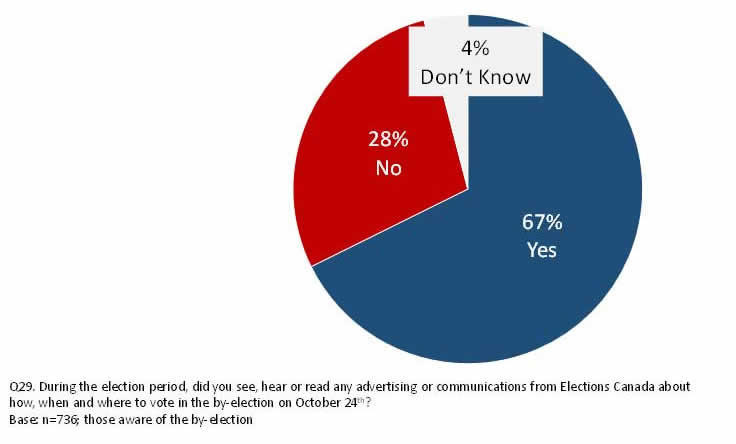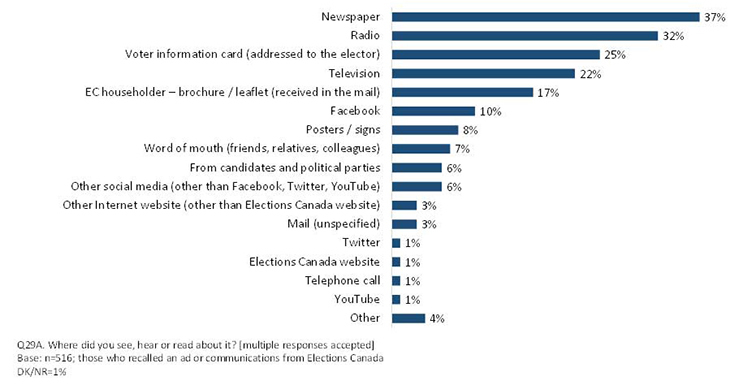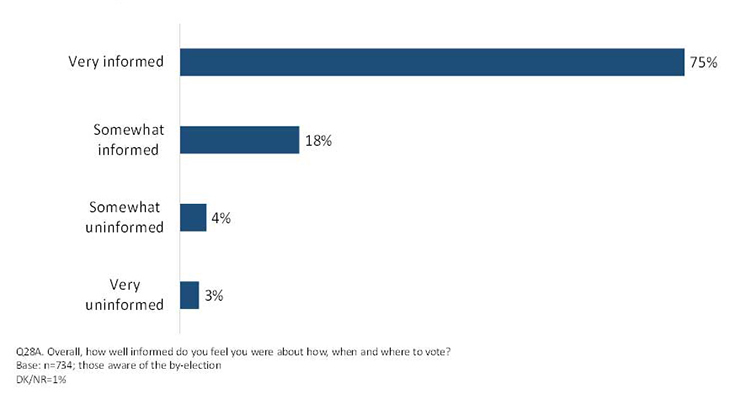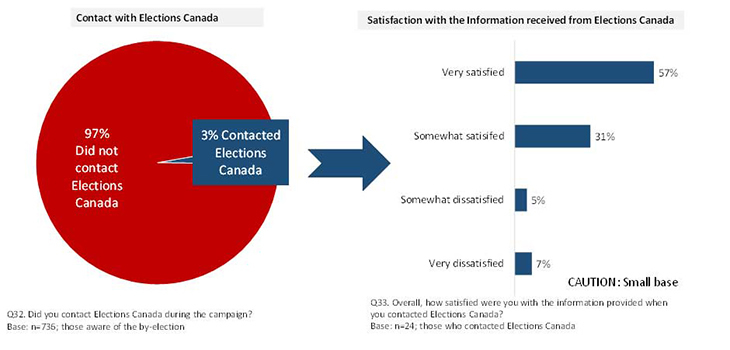Public Opinion Survey Following the October 24, 2016, By-election in the Medicine Hat–Cardston–Warner Riding
Awareness of the By-election and Voter Information
The vast majority of surveyed eligible voters (97%) said they were aware of the October 24, 2016, by-election in the federal electoral district of Medicine Hat–Cardston–Warner. The likelihood of being aware of the federal by-election increased with education, from 96% among electors with a high school education or less to 100% among university-educated electors. The likelihood was higher among employed electors (98%), retirees (99%) and homemakers (99%) than those who were unemployed (83%) at the time of the survey.
The rest of this section explores issues related to the communication channels Elections Canada used to distribute information to the electorate.
Moderate Recall of Elections Canada Advertising
A little over two thirds (67%) of eligible voters aware of the by-election said that they either saw, heard or read advertising or communications from Elections Canada about how, when and where to vote in the by-election; 28% said they didn't, and 4% could not recall.
Recall of Elections Canada Advertising

Text description of "Recall of Elections Canada Advertising"
The likelihood of recalling any advertising or communications from Elections Canada about the by-election was higher among retirees (77%) and homemakers (70%) than it was among electors employed (63%) at the time of the survey. Those who did not recall receiving a voter information card (44%) and those who voted at a polling station on election day (71%) were less likely to recall any advertising or communications about the by-election.
Newspapers–Most Common Source for Recalled Advertisements
Those who recalled seeing, hearing or reading advertising or communications from Elections Canada for the October 24 by-election were most likely to have noticed it in newspapers (37%) or on the radio (32%). In addition, one quarter (25%) stated that they recalled getting information about the by-election from their voter information card.
Television was cited by 22% of respondents when asked where they recalled seeing Elections Canada advertisements. Additionally, 17% said they recalled the advertisements from Elections Canada brochures and leaflets received in the mail. The rest of sources were identified considerably less often.
Source of Awareness

Text description of "Source of Awareness"
The likelihood of learning about the by-election through newspapers and television increased with age, from 6% among those under 25 years of age to 55% among those aged 55+ for newspaper, and from 6% among those under 25 years of age to 28% among those aged 55+ for television. Notably, electors aged 55 and older were less likely (16%) to have learned about the by-election on the radio, while those between 25 and 54 years of age were the most likely (47%) to point to this source of advertisement.
Voters Largely Informed about By-election Basics
When asked how well informed they felt in terms of how, when and where to vote, eligible voters aware of the by-election felt they were informed. Three quarters of eligible voters (75%) said they were very informed about the by-election. Conversely, roughly one fifth (18%) of eligible voters felt they were somewhat informed. Relatively few viewed themselves as somewhat uninformed (4%) or very uninformed (3%).
The graph on the next page depicts these results.
Knowledge of How, When and Where to Vote

Text description of "Knowledge of How, When and Where to Vote"
The likelihood of saying they were very informed about how, when and where to vote increased with age (47% of 18- to 24-year-olds vs. 83% of those aged 55 and over).
Few Visited Elections Canada's Website, Satisfaction Among Those Who Did
One in ten electors aware of the October 24 by-election did visit Elections Canada's website. Website visitors were generally satisfied with the information they found on Elections Canada's website–48% were very satisfied and 45% were somewhat satisfied. Dissatisfaction was low, but those who were not satisfied said that they were very dissatisfied with the information (6%).
Elections Canada's website

Text description of "Elections Canada's website"
Little Contact with Elections Canada
Only 3% of surveyed electors who were aware of the by-election said they had contacted Elections Canada during the campaign. Most of these respondents said they were satisfied with the information received from Elections Canada: 57% were very satisfied and 31% were somewhat satisfied.

